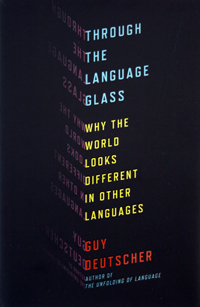 Through the Language Glass is the second book on linguistics by Guy Deutscher that I’ve read recently (the other being The Unfolding of Language).
Through the Language Glass is the second book on linguistics by Guy Deutscher that I’ve read recently (the other being The Unfolding of Language).
This popular science book explains various differences between languages, and tackles the rather thorny question of whether the language we think in affects our thoughts in any fundamental way.
Deutscher argues his points well, and I cannot disagree with any of the conclusions he reaches. Nevertheless, as the ultimate point is while that language has an impact on our thoughts and experiences this impact is relatively minor, this book has little that is truly surprising or unexpected.
It is still an interesting and enjoyable read, however, and recommended to those interested in linguistics.
 I have an enduring passion for and interest in language, and was thus quite intrigued when I read about Guy Deutscher’s two books, The Unfolding of Language and Through the Language Glass.
I have an enduring passion for and interest in language, and was thus quite intrigued when I read about Guy Deutscher’s two books, The Unfolding of Language and Through the Language Glass. I stumbled on Suzanne Romaine’s work Pidgin & Creole Languages quite by accident in a second-hand bookstore, and was immediately intrigued. I have a continuing interest in languages, especially how they work, how they differ and how they don’t differ, and this seemed to fit the bill perfectly.
I stumbled on Suzanne Romaine’s work Pidgin & Creole Languages quite by accident in a second-hand bookstore, and was immediately intrigued. I have a continuing interest in languages, especially how they work, how they differ and how they don’t differ, and this seemed to fit the bill perfectly. Saam met
Saam met  Dating from 1928 and 1936 respectively, they present research into the workings of these two languages. The first, Koranna, is a Khoisan language and I could find very little familiar there. I did, however, see the word aba (to carry a baby on one’s back), which has been borrowed into Afrikaans. The second, Soli, is clearly a Bantu language, and even with my rudimentary knowledge of Xhosa the relationship is clear to me, both in terms of grammar and vocabulary.
Dating from 1928 and 1936 respectively, they present research into the workings of these two languages. The first, Koranna, is a Khoisan language and I could find very little familiar there. I did, however, see the word aba (to carry a baby on one’s back), which has been borrowed into Afrikaans. The second, Soli, is clearly a Bantu language, and even with my rudimentary knowledge of Xhosa the relationship is clear to me, both in terms of grammar and vocabulary.